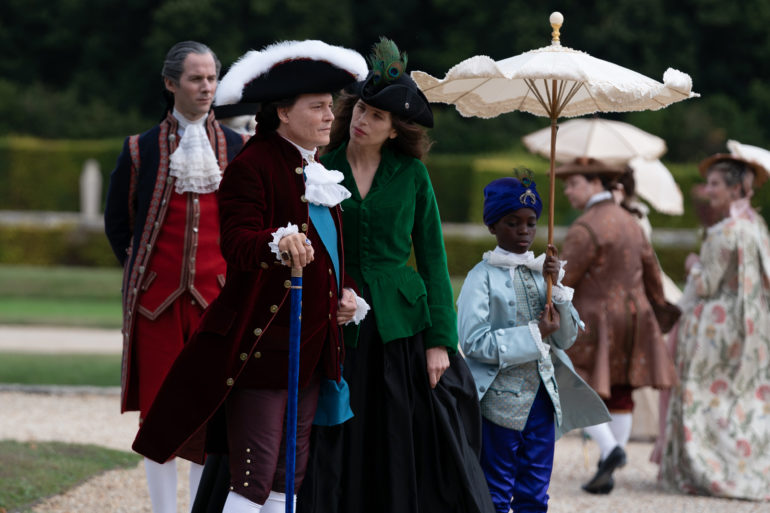Ah, controversy. Where would we be without it? More precisely, where would the Cannes Film Festival be without it? Every year, Thierry Frémaux and his team make a choice (intentional or otherwise) designed to bilk hangers-on and cause tizzies among the chronically online. For the festival’s 76th edition, the team have at least had the good grace to front-load some of the controversies this year. The result is Jeanne du Barry, a retelling of the story of the favoured mistress of Louis XV, with two tarnished stars in the leads, one of them directing, and a bucketful of rumours about the troubled production. Scandal! Intrigue! Both in the film and in real life! What a pity, then, that Maïwenn’s finished product should end up neither a doom-defying gem nor a delicious turkey for critics to carve. Something this potentially salacious shouldn’t be this middling.
The real-life story of Jeanne du Barry offers much to a director seeking to scandalize their audience. Born to a poor mother and an unknown father, Jeanne’s beauty caught the attention of her future husband, the Comte du Barry, who installed her as a leading courtesan in his Paris casino. Her list of illustrious clients saw her come to the attention of the king, and a hasty marriage to du Barry was arranged to allow her to become maîtresse-en-titre. Bonking, bustles and Versailles boudoirs; in an age of Bridgerton, this should be at least a bit of fun. The film opens with a young Jeanne being drawn by her patron, as if to let us know this is going to be the full story, from cradle to grave. Then comes the incessant narration to tell us this anyway. Jeanne du Barry doesn’t lack ambition, and Maïwenn’s choices, from camera angles to colours, suggest she’s happy to make use of all the money Netflix can give her. The director also takes on the lead role as Jeanne ages into womanhood and begins her career as a high-class courtesan.
Prior to its festival bow, a narrative built around Jeanne du Barry that suggested Depp’s involvement was part of an effort to restart his career after his domestic abuse lawsuit. However, between controversies past and present, this feels more like a rehabilitation on the part of Maïwenn. As co-written and played by the director, Jeanne is a victim of circumstances beyond her control. Thrust into the limelight of Versailles by her husband of convenience, du Barry (Melvil Poupaud), Jeanne attracts the attention of the king, who summons her to his bed-chamber, and soon finds herself ensconced as his favourite. Through all of this, though, a question simmers in the mind: why tell this story? Seeing a woman being pulled every which way by the whims of rich and powerful men should resonate more, but in this script Jeanne gets very few opportunities to assert herself. She seems more than content to luxuriate in Versailles’ plush surroundings and feels the loss when her status is threatened, but there’s no sense of her own agency or import. Her actions don’t affect the king’s policies or decisions, and we can only side with her when her relationship with the king pushes the noses of his spoiled daughters out of joint. Jeanne du Barry has some obvious points of comparison, but they do the film no favours. It lacks the scabrous wit of The Favourite, the bloody vim of La Reine Margot, or the subversive sense of fun of another Cannes opener, Sofia Coppola’s Marie Antoinette.
As Louis XV, Depp is adequate, which is about as much as the film and his career requires of him. He looks the part, and gets more screentime than expected, bringing his tired energy to a man who probably felt drained at the best of times (Hey, you try running France sometime). There are no moments of grandstanding to attract attention, which is probably for the best, though Louis’ relationship with Jeanne is hampered by the lack of palpable chemistry between Depp and Maïwenn. It isn’t fatal, but it does highlight the vacuum of a character at the centre of the action. Jeanne could be someone worth examining, but in Maïwenn’s hands, she’s a perpetual victim and a passive participant in her own story.On the other hand, if Jeanne had any gravity to her at all, would Maïwenn have wanted to play her, or even tell her story? Leaving aside any suggestions of ulterior motives on the filmmakers’ parts, Jeanne du Barry doesn’t add up to very much. It certainly looks the part, readily conveying the opulence of Versailles in its production design and costumes, and it boasts a terrific supporting turn from Benjamin Lavernhe as La Borde, Jeanne’s footman. La Borde ends up becoming an effective audience substitute, having emotional reactions to the characters that the audience simply can’t muster. Jeanne du Barry has opulence to spare, but there isn’t enough beneath that shiny veneer to convince that Jeanne’s story was worth telling.

